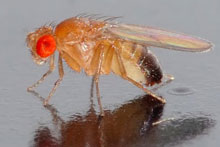
The common fruit fly. Photo by Andre Karwath.
Fruit flies infected with a blood-borne parasite consume alcohol to self-medicate, a behavior that greatly increases their survival rate, an Emory University study finds.
“We believe our results are the first to show that alcohol consumption can have a protective effect against infectious disease, and in particular against blood-borne parasites,” says Todd Schlenke, the evolutionary geneticist who led the research.
“It may be that fruit flies are uniquely adapted to using alcohol as medicine,” he adds, “but our data raise an important question: Could other organisms, perhaps even humans, control blood-borne parasites through high doses of alcohol?”
Current Biology is publishing the study, co-authored by Emory graduate student Neil Milan and undergraduate student Balint Kacsoh.
The results add to the growing body of evidence that some animals know how to use toxic substances found in nature as medicine.
Drosophila melanogaster, the common fruit fly that swirls around browning bananas in your kitchen, is an important biological model system. The Schlenke lab uses D. melanogaster to study how immune systems adapt to pathogens.
The fly larvae eat the rot, or fungi and bacteria, that grows on overripe, fermenting fruit. “They’re essentially living in booze,” Schlenke says. “The amount of alcohol in their natural habitat can range from 5 to 15 percent. Imagine if everything that you ate and drank all day long was 5-percent alcohol. We wouldn’t be able to live like that, but fruit flies are really good at detoxifying alcohol.”

